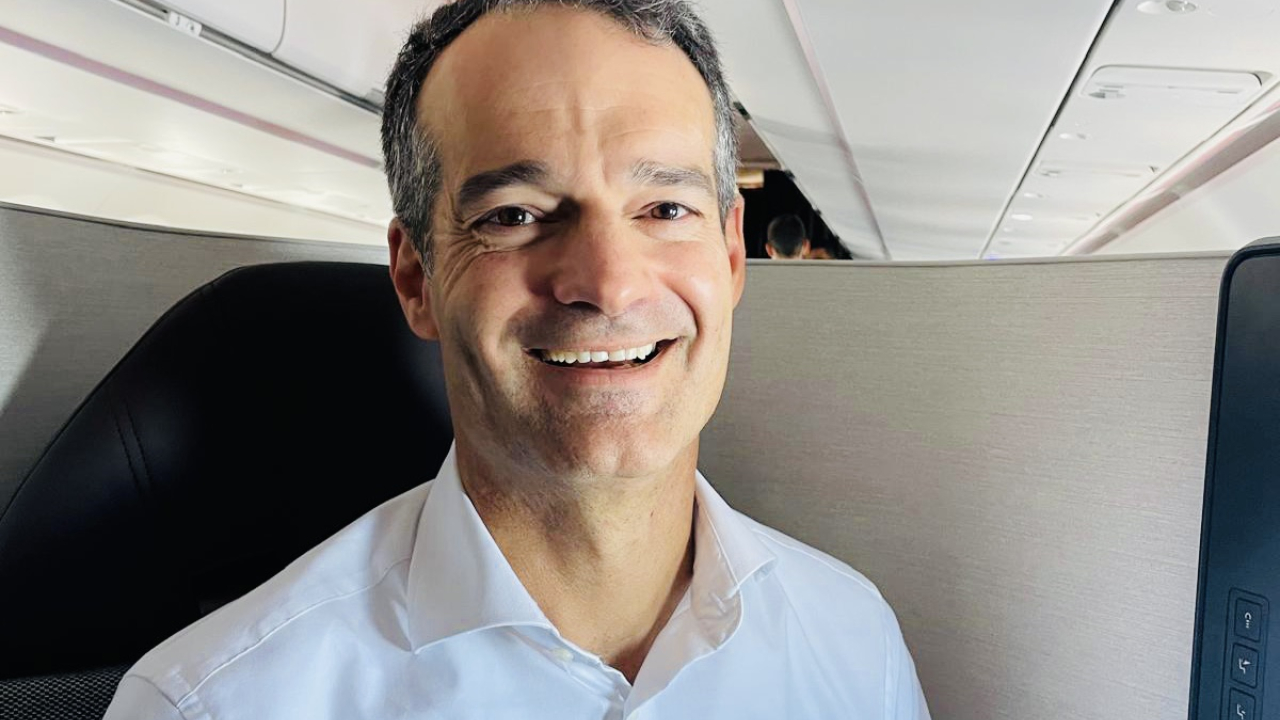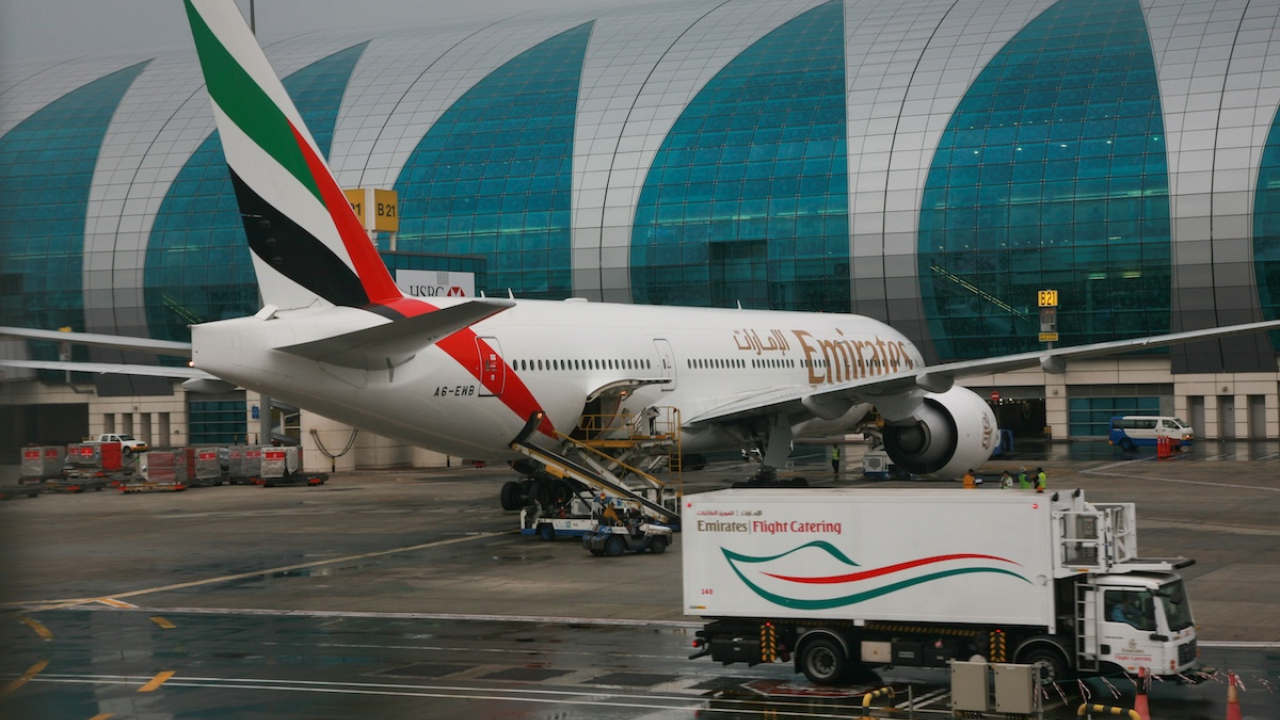Neves lays out Etihad’s new-look strategy as it returns to growth mode
Etihad Airways constantly revises its growth plan upwards as traffic, destinations and aircraft deliveries all increase. Aviation Week speaks with its CEO Antonoaldo Neves on the delivery flight of its first Airbus A321LR.

Etihad Airways CEO Antonoaldo Neves spoke to Arabian Aerospace from his airline’s new A321LR (photo: Mark Pilling).
“Etihad is back in the premium game,” declared Antonoaldo Neves, speaking to media, suppliers and Etihad colleagues on board his airline’s first-ever Airbus A321LR as it taxied out at the manufacturer’s Finkenwerder factory.
Moments later the long-range Airbus, which was scheduled to begin revenue service on services to Phuket a few days later, took off on the ferry flight to Abu Dhabi.
Etihad’s A321LR is no ordinary single-aisle, hence the premium comment from Neves, who will celebrate three years in charge at the beginning of November.
The first of 30 of the type to be delivered in the coming four years, Etihad’s new narrowbody will feature two first class suites and 14 business-class seats, along with 144 economy seats. Most carriers have long ago ditched first class on widebodies, let alone contemplated a luxury product on a narrowbody.
For Neves, the arrival of the A321LR, along with the return to service of its flagship A380s with their nine First Class Residence suites, are the prime examples of Etihad’s revival and expansive strategy under the carrier’s Brazilian CEO and his management team, which includes several colleagues from his days at TAP Air Portugal.
Looking back on nearly three years heading Etihad, the progress achieved so far has surprised Neves. “We have accelerated. The plan was to get to 17 million passengers by 2027-28. We have just done 20 million,” he said.
“We are two years ahead of where we were supposed to be,” said Neves. “It is because we are driving efficiency and agility, and the strategy is working.”
In terms of its capacity plan, the first phase of Etihad’s reworked strategy was formulated in 2023 when the decision to build up a fleet of A321LRs was taken. This was followed up a year later by the decision to top up its A321LR numbers, reactivate its A380s and extend the life of some of its Boeing 777s. It now has seven A380s in service with another waiting in the wings.
Etihad’s initial plan back in 2022/23 was to grow to 28 million passengers by 2030. This was revised upwards to 32 million in plan 2. “Now in plan 3 the aim is to get to about 38 million passengers by 2030,” said Neves, served by a fleet of 220 aircraft.
“We have delivered in the past three years, now we must deliver in the next three.”
Etihad is in strong growth mode once again following the severe down-sizing begun under former CEO Tony Douglas in 2017 as the loss-making carrier sought to retrench after its rapid expansion in the 2010s that including buying equity stakes in a variety of airlines including Alitalia and Air Berlin. The fleet reached its peak of 122 aircraft in 2017.
By the time Douglas was lured to start up Riyadh Air in 2022, Etihad had shrunk to just 67 aircraft and the A380s were indefinitely grounded.
In 2019 it was transitioned from the state to being owned by Abu Dhabi’s sovereign wealth fund ADQ so it could be managed as a private enterprise.
Why join Etihad?
And it was ADQ executives that discussed the Etihad role with Neves, who had run Brazilian low-cost carrier Azul, led TAP and had just sold his own digital travel business.
“I was curious about ADQ, this massive sovereign fund, and I was also curious about Abu Dhabi,” recalled Neves.
“The briefing [from ADQ] was clear,” he explained. “They said: We have this airline that we love, and Etihad is an airline that Abu Dhabi loves. We have restructured the airline which probably is going to break even this year [2022] and now we want to bring management in that is going to take this airline to the next level.”
ADQ executives asked Neves about his vision to create a modern flag carrier. “Number one, airlines should be successful. They need to be efficient, and efficiency has nothing to do with luxury,” he said.
“The second thing is customer service – you have got to deliver what you promise, and it doesn't matter if you're low cost or you're a luxury airline. It's about a culture to serve people and be there to serve the customers.”
“The third thing we discussed was we have got to have a strategy in terms of network that makes sense. We're not here to copy other airlines,” explained Neves.
The two philosophies gelled and as Neves puts it: “It was love at first sight.”
“Last but not least, I was inspired about the Abu Dhabi vision that says whatever we do in the world, we need to be top three. We want to punch above our weight. We are here for the very long term, to build a society that is based on fraternity and on development. I want to be in that place,” stated Neves.
Interestingly, ADQ laid out no targets for the new CEO. “They said there is only one condition. If you don't make money, you cannot grow,” he said.
The task ahead was clear: to build a plan where Etihad can invest.
The initial phase saw the carrier, using its own cashflow, setting out investment of $7 billion, which including selecting the A321LR, he explained. Further recent orders for Boeing 777-9s and 787-9s followed in May this year requiring investment of a further $20 billion, once again using the carrier’s own cash. Since Neves arrived, ADQ has not put a penny into Etihad, he said.
After breaking even in 2022 Etihad has been profitable. Its last financial year saw it deliver a 6% net profit margin, said Neves.
Profitability is heavily influenced in this industry by geo-political events and oil price fluctuations, he noted, adding: “Etihad is an airline that is structurally organised to deliver a margin of 7-8%. That is above average, but I want to be top tier. That means above 12%. My aspiration is to get to 12-15%.”
“What is important for us is the trend,” he said. There will be bumps along the way, he noted, “but if you take a seven-year journey and the trend is positive, then you are happy.”
Is an IPO on the cards?
While Etihad does not need to raise money in the market via an Initial Public Offering (IPO), the cyclical nature of the airline business means tough times can be just around the corner.
“I learnt from my days in Brazil that this industry is not for the faint of heart. One day you can be booming, the next day is bust,” he said.
“The most important thing that I learned is that you need to be ready to tap into different sources of capital whenever you need it.”
“I see IPOs as just another lever to source capital to finance the airline. And since day one, in alignment with the shareholder, I said I don't know if one day we're going to do an IPO, but I'm going to work very hard so that, if we need to do it, we are ready,” he explained.
What does ready look like? “Number one, we have clear understanding of our margin expansion levers,” said Neves, something investors are always fixated upon.
“Second, we need to have a clear strategy so that people understand what you're doing. They want to know how I'm going to differentiate myself from other airlines, so that other airlines are not going to come and crush me.”
“Thirdly, I need to have great governance, and I need to have a team, and a board, that is capable to deliver a lot, because the markets are cruel you cannot hide. Since day one, we put a lot of energy behind this.”
For Neves this work is all about giving the new look Etihad the right foundations on which to build.
Bringing the A321LR on board is a key part of that plan. “About two years and a half ago, we said, it's time for Etihad to bring something new to the market,” he announced during the unveiling ceremony of its A321LR.
“It is time for Etihad to be shaping, again, the future of aviation from a customer service perspective, and we decided to invest a lot of time in the A321.”
“This aircraft represents far more than just another delivery event. It's a symbol of innovation and evolution in Etihad as we become the first airline to bring its renowned widebody luxury experience to short haul,” said Neves.
With the A321LR, Etihad is convinced it is not just back in the growth game it is back in the premium game as it seeks to be the master of its own destiny once again.
Stay up to date
Subscribe to the free Times Aerospace newsletter and receive the latest content every week. We'll never share your email address.

